SoccerToday Exclusive Spotlight: Youth Soccer in America
Soccer is the world’s favorite sport and is played by kids all across America. More kids are playing this popular sport than ever before. Are there differences in training? Who are the influencers in different areas? Millions of kids are happily becoming youth soccer players in the USA. Having looked at soccer in California, New York, New Jersey, Washington, Utah and Pennsylvania, here’s the inside scoop on youth soccer in Tennessee.
Diane Scavuzzo recently spoke with Lee Smith, Director of Coaching for the US Youth Soccer‘s Tennessee State Soccer Association to discover what is happening in the country music capital and the land locked state of the U.S. South.
 Diane Scavuzzo: What is the biggest problem with youth soccer player development in the USA?
Diane Scavuzzo: What is the biggest problem with youth soccer player development in the USA?
Lee Smith: The youth soccer players have to come first.
We all have too many ideas and directions while lacking structure on how to improve player development with little or no clear club mission statements. I could discuss so many different aspects on the problems of youth soccer in America, but I will focus on two main issues.
The first problem with youth soccer in America? Directors of Coaching should make decisions concerning youth soccer clubs in the best interest of the game and player development, not based off of their finances interests.
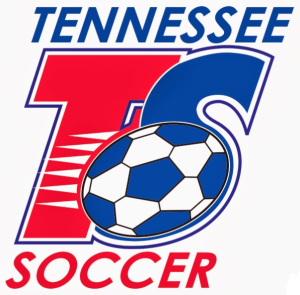 As an example, too many of our DOC’s are partially paid by tournaments that they bring in. This impacts the youth soccer clubs and their players because DOCs typically send teams to tournaments in which they benefit financially regardless of if their participation is in the best interest of player development.
As an example, too many of our DOC’s are partially paid by tournaments that they bring in. This impacts the youth soccer clubs and their players because DOCs typically send teams to tournaments in which they benefit financially regardless of if their participation is in the best interest of player development.
DOCs push their teams to tournaments in support of each others tournaments. This adds to increasing expenses paid by parents “making soccer expensive” and pushes for more games and less practices which is the opposite of what is needed during key devlopment years.
The intensity and frequency of so many games doesn’t allow players to physically recover causing training practices to be less beneficial.
The second main problem is the issue of encouraging winning at all cost, rather than the goal of playing the game well by possessions, build up, tactical planning – or in other words, developing youth soccer players.
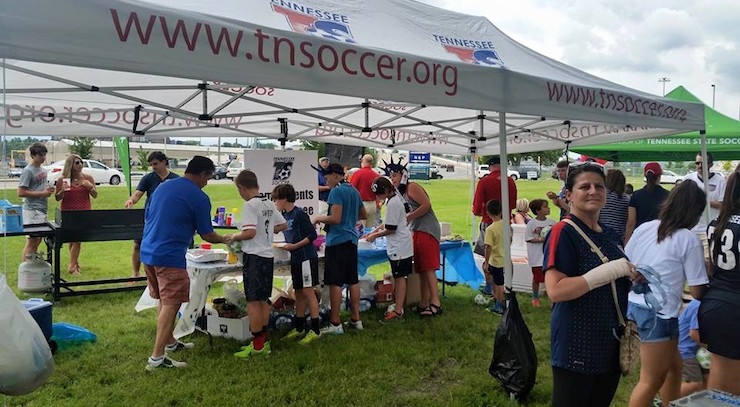 The point is to understand that players need to be focused on developing their skills, looking forward to a long-term participation in soccer, and soccer parents should be taught how to support this development phase.
The point is to understand that players need to be focused on developing their skills, looking forward to a long-term participation in soccer, and soccer parents should be taught how to support this development phase.
Diane Scavuzzo: Is soccer popular in Tennessee? How many players do you have registered?
Lee Smith: Soccer is very popular in our state. Regarding child players, we have 15,835 female players and 21,241 male players registered currently.
Our recreation numbers for the year are still coming in and we should hit a total of over 42,000 registered soccer players this summer.
Diane Scavuzzo: How technology friendly is your state association?
Lee Smith: Tennessee State Soccer Association, or TSSA for short, uses our TSSA website, Facebook, Twitter, and TeamAPP to effectively stay in touch with our communities and members. We use online videos and online coaching information for our members.
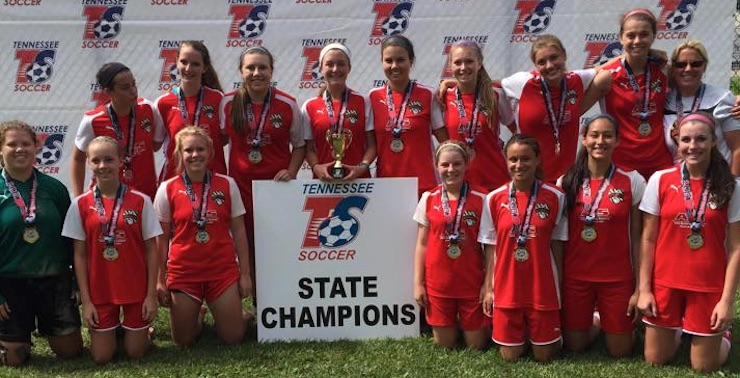 While we don’t have digital player cards, it’s easy for our club administrators to print cards on day of our youth soccer games and events, if needed.
While we don’t have digital player cards, it’s easy for our club administrators to print cards on day of our youth soccer games and events, if needed.
Diane Scavuzzo: What are the challenges your state association faces?
Lee Smith: Two of our challenges pertain to kids playing high school soccer. The high school soccer rules do not allow youth soccer players to participate in their soccer clubs during high school soccer season.
Our girls high school season is in the fall and the boys is in the spring and this creates issued for our TSSA State Cup. TSSA solves this challenge by holding our This State Cup for U14 and older boys’ championship in November and the remaining boys’ and all the girls’ championships in May.
Diane Scavuzzo: How do you see your role in youth soccer today?
Lee Smith: I believe TSSA exists to help direct and promote the game of soccer. To reach this goal and help our members, we focus on several aspects of the overall game: nutrition, physical development, sportsmanship, championships, Olympic Development programs, TOPSoccer programs, and coaching education/development — just to mention a few of our TSSA initiatives.
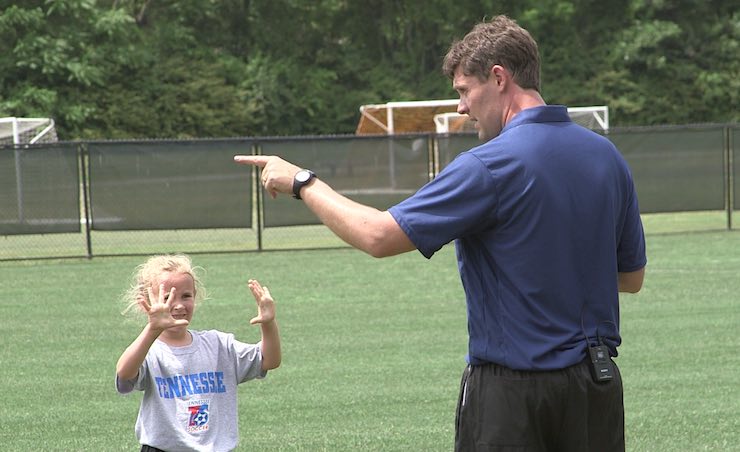 Diane Scavuzzo: What is the role of a coach in youth soccer in the USA today?
Diane Scavuzzo: What is the role of a coach in youth soccer in the USA today?
Lee Smith: Coaches are critical to the process of expanding youth soccer in the USA and we have very talented individuals coaching in Tennessee.
Our goal is that coaches are teaching all aspects of the game of soccer in a fun and challenging way.
Coaches also have a large role in player development from social interaction, physical development, psychological understanding and teaching how to be a good citizen, all from teaching within the game of soccer so it is a big challenge and responsibility.
Diane Scavuzzo: What does player development mean for your state association? What type of environment is best for developing players?
Lee Smith: Player development means so much today: sportsmanship, commitment to teams, skill development, tactical development and the list can go on and on. The player development environment is important, but a perfect environment for all players doesn’t exist — what works for one player, may not work well for another player. The environment that the coach creates, along with the teammates, plays a pivotal role in successful player development.
This is one of the reasons it is so important to highlight the importance of good soccer coaching education. Coaches need to know how to effectively create a positive environment that will ignite the players’ passion of just playing the game.
Diane Scavuzzo: How large is your Olympic Development Program (ODP)?
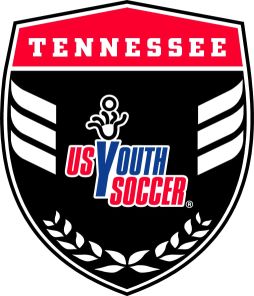 Lee Smith: We start with approximately 700 youth soccer players in the beginning for our Tennessee State Soccer Association ODP and ended up with about 280 players actually attending our Region III trials in July.
Lee Smith: We start with approximately 700 youth soccer players in the beginning for our Tennessee State Soccer Association ODP and ended up with about 280 players actually attending our Region III trials in July.
Last year, we had 36 named staff but use 15 soccer coaches in addition during tryout sessions. This season, we increased our named staff to 39 and continue to add more soccer coaches in addition to our state staff.
Diane Scavuzzo: How many female coaches are there in your state? Do female coaches face any special challenges?
Lee Smith: About 165 female coaches are currently registered in our state.
I do hear that female coaches are forced to prove themselves to other coaches, parents, and players that they possess the knowledge of the game compared to having that knowledge assumed as a male coach often does.
We have very talented female coaches in our state and we need to continue to encourage and support their involvement because they are inspiring the future of US women’s soccer.
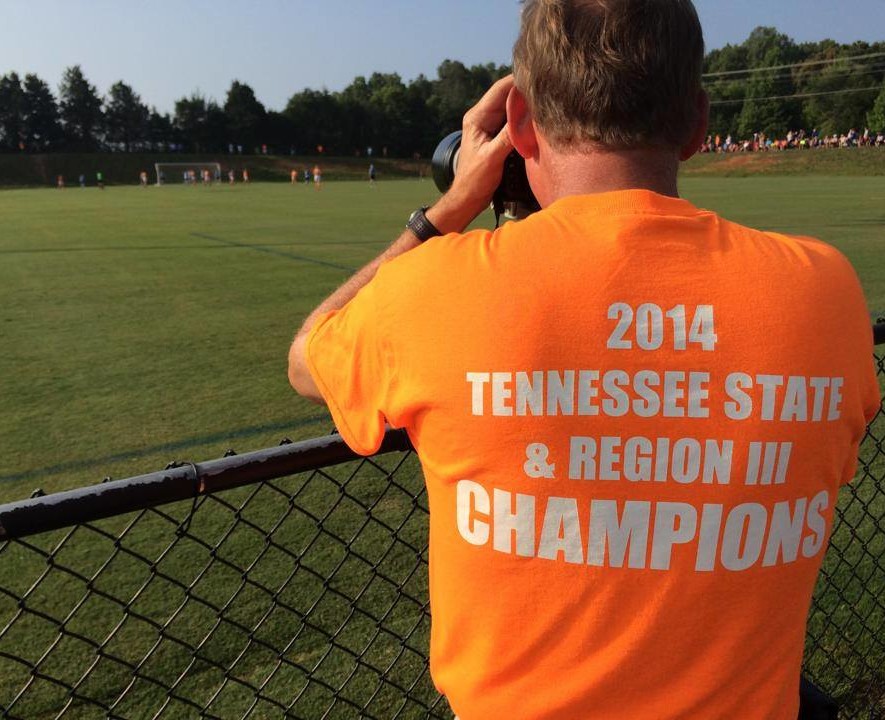 Diane Scavuzzo: Any thoughts on when parents think winning is more important than their kids do? The impact of the soccer sideline.
Diane Scavuzzo: Any thoughts on when parents think winning is more important than their kids do? The impact of the soccer sideline.
Lee Smith: I do think most parents understand that practice is needed and it may take some time for players to learn the skills so they can start winning, but this can be hard for everyone to remember.
For most parents, the desire for your child to win begins pretty much the moment a parent’s child walks onto any sport’s field or court.
All parents and coaches should monitor their own behavior and how we convey this point to our kids so that winning doesn’t become the main focus of sport participation. We want the best for our kids but sometimes our delivery and the physical gestures usually don’t relay the intent of the message correctly.
Diane Scavuzzo: How much do you believe youth soccer has turned into a business and that player development and the simple joy of playing the game suffer as a result?
Lee Smith: I do agree with the statement to some degree. Soccer has become a business for a majority of the youth soccer programs but they don’t realize it. There is still competitive play just for the joy of the game; however, it is getting harder to find these programs. A lot of these youth soccer programs have the best intention not to be a money-centered business yet the bottom line ultimately is money and it dictates what can and can’t be done — and this emphasis on finances starts to pull the focus away from the club mission of player development.
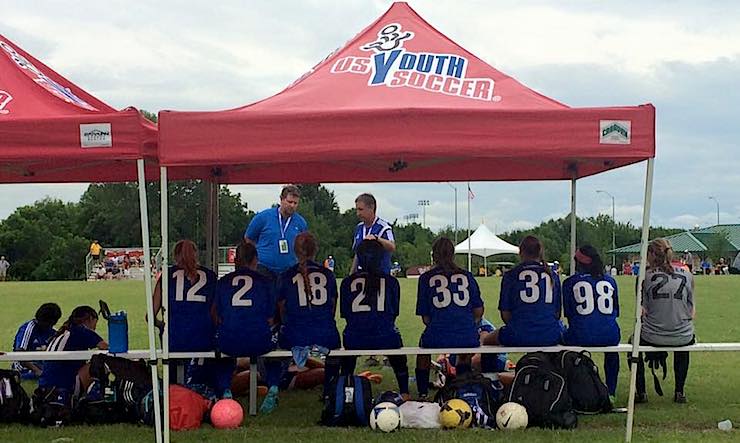 Diane Scavuzzo: Why do you think America has not been more successful so far at developing a homegrown Messi?
Diane Scavuzzo: Why do you think America has not been more successful so far at developing a homegrown Messi?
Lee Smith: We need to look at the various different ways that the game is being hindered in our country.
First, we need to look to increase more quality practices in all age groups and step away from the high number of tournament games.
Secondly, clubs push soccer specialization too early and are not allowing players to experience different perspectives/skills that multiple sports can offer our players. This can also help combat the high burnout rate in soccer.
Third, youth soccer players are being burned out or financially scratched out too early which doesn’t let us see what they can become.
In addition, we need to look at our adult programs for players ages 18 and older and see how we can encourage these players’ continued participation with our current programs or lack of programs.
Much of the responsibility falls on the type of guidance/direction coaches get within their clubs for their teams as well as the missing emphasis on continued coaching education to help see more of the bigger picture for the players.
Finally, we could also bring up the topic of allowing children and adults more free play pick-up games. The bottom line is that we need to discuss and start making a change.
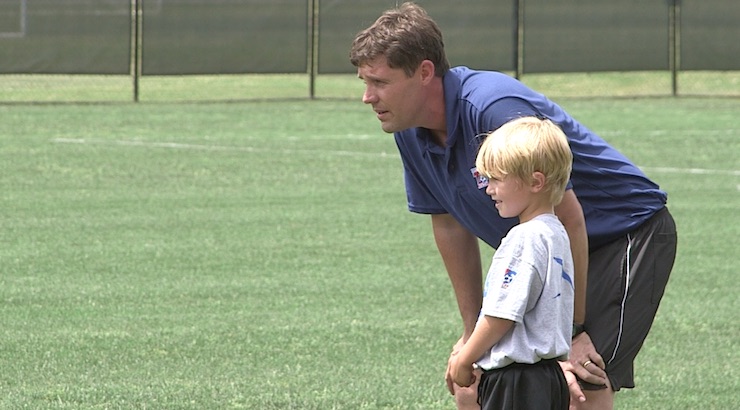 Diane Scavuzzo: Why did you become involved with soccer? What inspires you?
Diane Scavuzzo: Why did you become involved with soccer? What inspires you?
Lee Smith: I love the sport for how simple it is and at the same time, how complex it can be. I also like to teach and be outdoors. I am inspired by working with players, the challenge of developing their skills, and when the players themselves see the reward for putting in hard work.
Diane Scavuzzo: When did your passion for soccer start?
Lee Smith: I enjoyed playing the sport early in my youth years but it wasn’t until around age 17 did I start to see that I could mix playing the sport along with another passion of mine, teaching.
Diane Scavuzzo: What is your favorite soccer team?
Lee Smith: At the national level it’s USA and that will never change.
Diane Scavuzzo: Where did you train as a youth player?
Lee Smith: On fields that were mowed once a month and, trust me, it was not Bermuda grass. I played for ETSF “Falcons” in Johnson City, TN.
Diane Scavuzzo: Did you play in college?
Lee Smith: Yes, I was left back at the University of Tennessee at Chattanooga.
Diane Scavuzzo: If you look back at your career, what is the one thing you would change, if you could?
Lee Smith: Nothing. I am who I am because of what I went through and anything other may have altered who I am today. However, I would have liked that grass on my youth practice field to have been mowed more.
RELATED ARTICLE: YOUTH SOCCER IN PENNSYLVANIA WEST






